POP CULTURE POSTS
POP CULTURE POSTS
Movies
Addams Family
The Avengers
The Avengers: Age of Ultron
Being Sorted at Hogwarts
The Breakfast Club
The Breakfast Club (Text)
Children of the Corn
Classic Movies
Clueless
Dumbledore Analysis
High School Musical
Disney Princesses
Disney Princess (2)
Disney Princess Compatibility
Disney Songs
Disney Villains
Fight Club
Finding Nemo
Freaky Friday
The Great Gatsby
Harry Potter
Harry Potter Compatibility
Harry Potter Movie Quotes
Harry Potter Things
Hogwarts Houses
Mean Girls Characters
Mean Girls Lunch Tables
Mermaid Movies
Minions
Movie Cliches
Panem Districts (Hunger Games)
Percy Jackson
The Purge
Receiving a Hogwarts Letter
Tim Burton Movies
Unfriended
Music
American Tragedy Songs
Anaconda (1)
Anaconda (2)
Arctic Monkey Lyrics
Arctic Monkey Songs
Artpop Songs
Bad Blood
Badlands vs Beauty Behind the Madness
Beatles Songs
Beauty Behind the Madness Songs
Blank Space Lyrics
Blank Space vs Shake it Off
Blink-182 Songs
Body Electric vs Born to Die
Born to Die Songs
Born to Die: Paradise Edition Songs
Britney Spears Phases
Colors // Halsey
Coming Down // Halsey
The Doors Songs
Drake
Four Songs
Hannah Montana Songs
Electra Heart Archetypes
Foster the People Songs
Gods & Monsters
Halsey’s Hair
Hello // Adele
Holy Trinity
Icona Pop Songs
Iggy vs Nicki
Kid Cudi Songs
K-Pop Groups
Lana del Rey Albums
Lana del Rey Songs
Lana lyrics for Mars
Led Zeppelin Songs
Lorde Songs
Love Songs
Michael Jackson Songs
Midnight Memories Songs
Milky Chance Songs
Modest Mouse Songs
Money, Power, Glory
My Everything Songs
One Direction Albums
One Direction // Elements
One Direction & 5SOS: The 75%
Pepsi Cola vs Diet Mountain Dew
Piña Colada Song
Pink Friday vs Pink Print
Pinkprint Songs
Rappers
Rolling Stones Songs
Strange Love // Halsey
Strokes Songs
Sucker Songs
Ultraviolence Songs (Text)
Ultraviolence Songs (Image)
The Weeknd Songs
Zayn Malik
1975 Lyrics
1975 Songs
1989 Songs
5SOS Members
5SOS Songs
TV Shows
Adventure Time Characters
American Horror Story Asylum
American Horror Story Coven
American Horror Story Coven Powers
American Horror Story Freak Show
American Horror Story Murder House
American Horror Story Seasons
Attack on Titan Gifs
Breaking Bad
Criminal Minds
Doctor Who
FRIENDS
Game of Thrones
House M.D.
H2O
Kardashian Gifs
London or Maddie?
Nick vs. CN vs. Disney Channel
Ouran Highschool Host Club
Pretty Little Liars
Powerpuff Girls
Sailor Moon
Sherlock (BBC)
Shows for the Signs
Skins Generation One
Skins Generation Two
Supernatural
Teen Titans
Teen Titans (text)
Total Drama Island
Zack or Cody?
Misc.
Brangelina
Fairy Tales
Famous Authors
Famous Monsters & Cryptids
Famous Quotes
Fandoms
Historical Figures
Iconic People of 2015
I’m in Me Mum’s Car
Lana del Rey Tweets
Madonna x Drake
Mario Kart Weapons
Problematic Celebrities
Rare Pepe
Retro Videogames
Shakespeare
Shrek is Love
Social Medias
Sonic
Sunday Comics
Tumblr Aesthetics
Tumblr Clothing
Tumblr Fandoms
White Girl Trends
Who you should Date
More Posts from Smartler and Others
fyeahastropics:
THAT STAR IS NOT DEAD.
Im sure you’ve seen the post or heard the quote “when you wish upon a star, technically that star is a million light years away and it’s already dead, just like your dreams”
This is false. That star is not dead, it is not millions of light years away! the Milky Way galaxy is 100,000 light years across, so the oldest light reaching us from a star in our galaxy would be less than 100,000 years old (because we aren’t on the very edge). Stars live for millions and billions of years! Sure that supernova we viewed from another galaxy is from a star that had been dead for ages, but the stars you see at night are much closer and very much still burning brightly!
The light you are seeing of a star is old, but the star itself is not dead and neither are your dreams!
-this has been a slightly uplifting rant by janestreetdog (who is peeved by this misconception)
When you wish upon a star
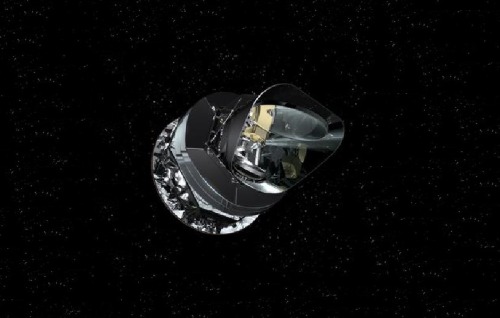
The Planck Spacecraft had a series of various objectives including; hi-res imaging of the CMB, cataloging galaxy clusters, observe gravitational lensing, bright extra-galactic radio and infrared (dusty galaxy) sources. http://astronomyisawesome.com/universe/the-age-of-the-universe/
What Are the Bright Spots on Ceres?

Dwarf planet Ceres has more than 130 bright areas, and most of them are associated with impact craters. Now, Ceres has revealed some of its well-kept secrets in two new studies in the journal Nature, thanks to data from our Dawn spacecraft.
Two studies have been looking into the mystery behind these bright areas. One study identifies this bright material as a kind of salt, while the other study suggests the detection of ammonia-rich clays.
Study authors write that the bright material is consistent with a type of magnesium sulfate called hexahydrite. A different type of magnesium sulfate is familiar on Earth as Epsom salt.

Researchers, using images from Dawn’s framing camera, suggest that these salt-rich areas were left behind when water-ice sublimated in the past. Impacts from asteroids would have unearthed the mixture of ice and salt.
An image of Occator Crater (below) shows the brightest material on Ceres. Occator itself is 60 miles in diameter, and its central pit, covered by this bright material, measures about 6 miles wide. With its sharp rim and walls, it appears to be among the youngest features on the dwarf planet.

In the second nature study, members of the Dawn science team examined the composition of Ceres and found evidence for ammonia-rich clays. Why is this important?
Well, ammonia ice by itself would evaporate on Ceres today, because it is too warm. However, ammonia molecules could be stable if present in combination with other minerals. This raises the possibility that Ceres did not originate in the main asteroid belt between Mars and Jupiter, where it currently resides. But instead, might have formed in the outer solar system! Another idea is that Ceres formed close to its present position, incorporating materials that drifted in from the outer solar system, near the orbit of Neptune, where nitrogen ices are thermally stable.

As of this week, our Dawn spacecraft has reached its final orbital altitude at Ceres (about 240 miles from the surface). In mid-December, it will begin taking observations from this orbit, so be sure to check back for details!
ake sure to follow us on Tumblr for your regular dose of space: http://nasa.tumblr.com

Where are her pants?
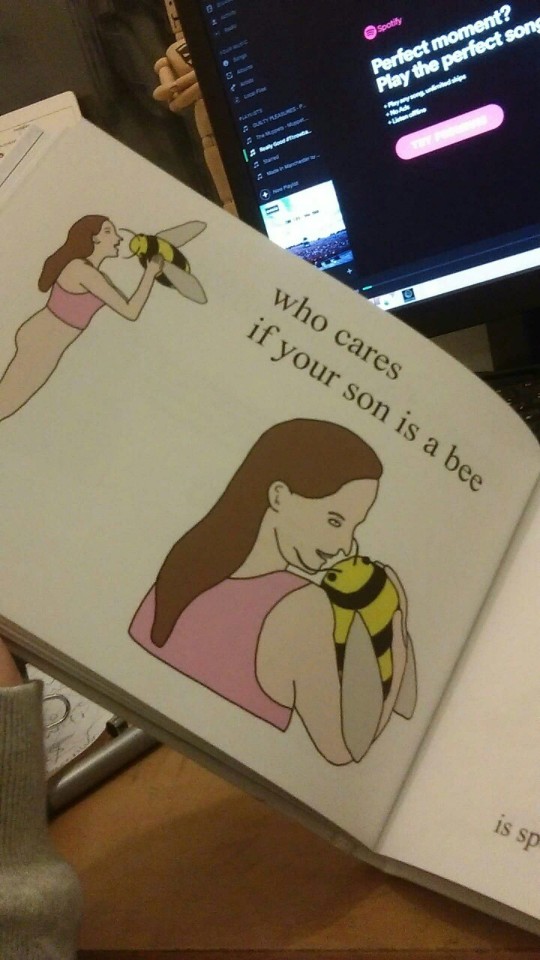




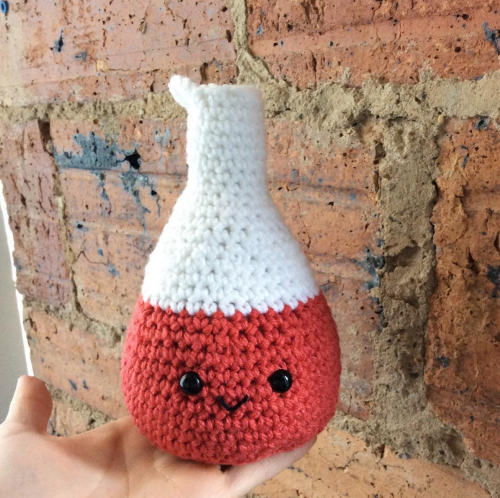
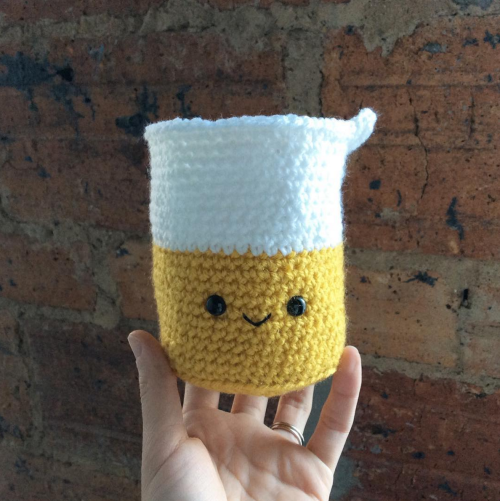


Textile Art + Science = Crocheted Chemistry
Dallas, TX-based textile artist Lauren Espy just completed crocheting the cutest chemistry set we’ve ever seen. Each handmade piece of amigurumi lab equipment, colorful beakers and test tubes, and a fiery little bunsen burner (our favorite), wears a smiling face that clearly says they’re ready to do some awesome science.

Follow Lauren Espy on Instagram to check out more of her crocheted creations. Espy sells some of her pieces via her Etsy shop, where she plans to list smaller pieces of crocheted chemistry equipment in the near future. So stay tuned!
[via A Menagerie of Stitches]
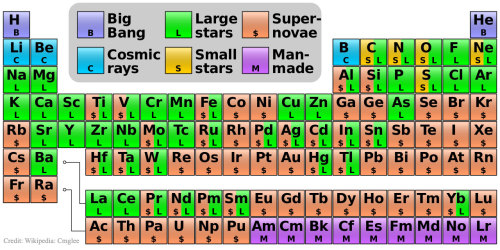
Where Your Elements Came From
(via APOD; Image Credit: Cmglee (Own work) CC BY-SA 3.0 or GFDL, via Wikimedia Commons )
The hydrogen in your body, present in every molecule of water, came from the Big Bang. There are no other appreciable sources of hydrogen in the universe. The carbon in your body was made by nuclear fusion in the interior of stars, as was the oxygen. Much of the iron in your body was made during supernovas of stars that occurred long ago and far away. The gold in your jewelry was likely made from neutron stars during collisions that may have been visible as short-duration gamma-ray bursts. Elements like phosphorus and copper are present in our bodies in only small amounts but are essential to the functioning of all known life. The featured periodic table is color coded to indicate humanity’s best guess as to the nuclear origin of all known elements. The sites of nuclear creation of some elements, such as copper, are not really well known and are continuing topics of observational and computational research.
“This Love” - Taylor Swift (Piano & String Version) by Sam Yung.
credit to the owners

There are many different ways to make nanomaterials but weaving, the oldest and most enduring method of making fabrics, has not been one of them – until now. An international collaboration led by scientists at the U.S. Department of Energy (DOE)’s Lawrence Berkeley National Laboratory (Berkeley Lab) and the University of California (UC) Berkeley, has woven the first three-dimensional covalent organic frameworks (COFs) from helical organic threads. The woven COFs display significant advantages in structural flexibility, resiliency and reversibility over previous COFs – materials that are highly prized for their potential to capture and store carbon dioxide then convert it into valuable chemical products.
“We have taken the art of weaving into the atomic and molecular level, giving us a powerful new way of manipulating matter with incredible precision in order to achieve unique and valuable mechanical properties,” says Omar Yaghi, a chemist who holds joint appointments with Berkeley Lab’s Materials Sciences Division and UC Berkeley’s Chemistry Department, and is the co-director of the Kavli Energy NanoScience Institute (Kavli-ENSI).
“Weaving in chemistry has been long sought after and is unknown in biology,” Yaghi says. “However, we have found a way of weaving organic threads that enables us to design and make complex two- and three-dimensional organic extended structures.”
Continue Reading.
-
 catboy-lover-archive liked this · 5 years ago
catboy-lover-archive liked this · 5 years ago -
 misandristical liked this · 6 years ago
misandristical liked this · 6 years ago -
 astrolightyear liked this · 6 years ago
astrolightyear liked this · 6 years ago -
 spiritual-pisces-blog1 liked this · 6 years ago
spiritual-pisces-blog1 liked this · 6 years ago -
 destruir-transformar liked this · 7 years ago
destruir-transformar liked this · 7 years ago -
 maria-dearest liked this · 7 years ago
maria-dearest liked this · 7 years ago -
 outsainted liked this · 7 years ago
outsainted liked this · 7 years ago -
 crazy-lif3-wh3n-th3-duck-quaks reblogged this · 7 years ago
crazy-lif3-wh3n-th3-duck-quaks reblogged this · 7 years ago -
 geilene-blog liked this · 7 years ago
geilene-blog liked this · 7 years ago -
 lizidgaf liked this · 7 years ago
lizidgaf liked this · 7 years ago -
 k8-vonb liked this · 7 years ago
k8-vonb liked this · 7 years ago -
 ig-baphomettebaddie reblogged this · 7 years ago
ig-baphomettebaddie reblogged this · 7 years ago -
 fluorescentad0lescentx liked this · 7 years ago
fluorescentad0lescentx liked this · 7 years ago -
 takethlstourgrave reblogged this · 7 years ago
takethlstourgrave reblogged this · 7 years ago -
 takethlstourgrave liked this · 7 years ago
takethlstourgrave liked this · 7 years ago -
 folsense liked this · 7 years ago
folsense liked this · 7 years ago -
 totallyvirtualsweets liked this · 7 years ago
totallyvirtualsweets liked this · 7 years ago -
 jdkdkdkkdc liked this · 8 years ago
jdkdkdkkdc liked this · 8 years ago -
 tey-x liked this · 8 years ago
tey-x liked this · 8 years ago -
 marije94 liked this · 8 years ago
marije94 liked this · 8 years ago -
 maverick20190 liked this · 8 years ago
maverick20190 liked this · 8 years ago -
 carlathepimp reblogged this · 8 years ago
carlathepimp reblogged this · 8 years ago -
 gloria5413 liked this · 8 years ago
gloria5413 liked this · 8 years ago -
 darcyspacegirl liked this · 8 years ago
darcyspacegirl liked this · 8 years ago -
 zombiebinkie liked this · 8 years ago
zombiebinkie liked this · 8 years ago -
 turtlekneck liked this · 8 years ago
turtlekneck liked this · 8 years ago -
 winternaut liked this · 8 years ago
winternaut liked this · 8 years ago -
 pinkbabby reblogged this · 8 years ago
pinkbabby reblogged this · 8 years ago -
 pinkbabby reblogged this · 8 years ago
pinkbabby reblogged this · 8 years ago -
 pinkbabby reblogged this · 8 years ago
pinkbabby reblogged this · 8 years ago -
 pinkbabby liked this · 8 years ago
pinkbabby liked this · 8 years ago